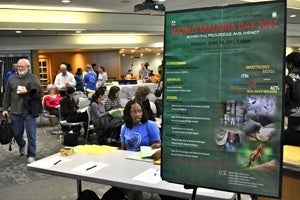Plasmodium falciparum gametocyte production correlates with genetic markers of parasite replication but is not influenced by experimental exposure to mosquito biting.
Blanken SL, Barry A, Lanke K, Guelbeogo M, Ouedraogo A, Soulama I, Coulibaly SA, Teelen K, Graumans W, Dumont E, Stone W, Ramjith J, Marti M, Andrade CM, Drakeley C, Collins K, Tiono A, Bousema T.
EBioMedicine. 2024 Jul. 105:105190. PMID: 38901148

